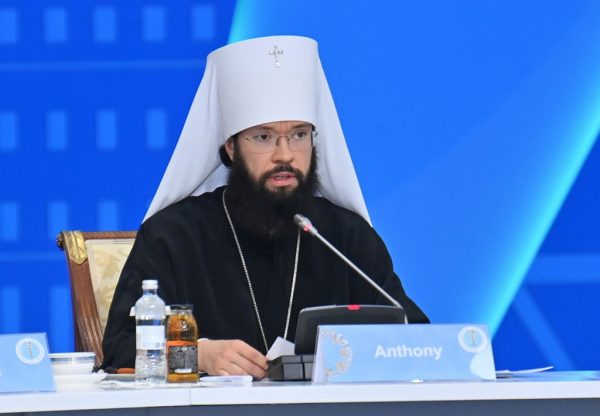The 7th Congress of the Leaders of World and Traditional Religions concluded its work in Nur-Sultan on September 15. President Kassym-Jomart Tokayev of the Republic of Kazakhstan led the closing ceremony; Maulen Ashimbayev, chair of the Senate of the Parliament and head of the Congress secretariat acted as moderator.
The Final Declaration of the Congress was read out.
Addressing the participants were highly respected representatives of religious communities, including Pope Francis; Metropolitan Anthony of Volokolamsk, Chairman of the Moscow Patriarchate’s Department for External Church Relations (DECR); Ahmed el-Tayeb, Grand Imam of al-Azhar University; and Yitzhak Yosef, the Sephardi Chief Rabbi of Israel. They shared their opinion on the Declaration and named the main outcome of the Congress attending which were over one hundred delegations from different countries. The Moscow Patriarchate was represented also by Metropolitan Veniamin of Minsk and Zaslavl, Patriarchal Exarch of All Belarus; Metropolitan Alexander of Astana and Kazakhstan, head of the Kazakhstan metropolitan district; Metropolitan Kirill of Kazan and Tatarstan; Archimandrite Philaret (Bulekov), DECR deputy chairman; and Rev. Dimitry Safonov, DECR secretary for interreligious relations.
Metropolitan Anthony underscored in his address that the faithful are called “to hold an active position, help peace building, participate in the settlement of conflicts, and preach the values of compassion, accord, and love.” Besides, the hierarch reminded religious leaders of the necessity to be firm in their witness about the value of human life, saying that this witness would be more convincing if brought together.
DECR chairman pointed out that the final document of the Congress “is based on the recognition of the fact of creation of human beings and all things by God, of Divine Providence and God-given laws of life and rules of morality.” He expressed appreciation of some items of the Declaration pertaining to the role of religious leaders in overcoming pernicious effects of certain developments, in preserving cultural and religious diversity, in developing religious education as an instrument for preventing extremism, and in surmounting injustice and inequality among countries and peoples.
In conclusion of his address, Metropolitan Anthony thanked the organizers and participants of the Congress and wished them strength in their important ministry.
Prior to the closing ceremony, panel sessions were held at the Palace of Independence on the role of religions in strengthening spiritual and moral values in today’s world; the role of religious education in fostering respectful coexistence of religions and cultures, strengthening peace and accord; contribution of religious and political leaders in developing global interreligious dialogue and peace and in countering extremism, radicalism, and terrorism; and on contribution of women to prosperity and sustainable development of modern society and the role of religious communities in supporting the social status of women.
One of the Orthodox speakers at panel sessions was Vladimir I. Yakunin, chairman of the Supervisory Board of Dialogue of Civilizations Research Institute. Among those attending the Congress were Sergey A. Gavrilov, a deputy of the Russian State Duma; representatives of the Muslim and Buddhists communities of Russia.
The Moscow Patriarchate delegation attended an official reception given after the Congress on behalf of Maulen Ashimbayev, chair of the Senate of the Parliament of the Republic of Kazakhstan.

















